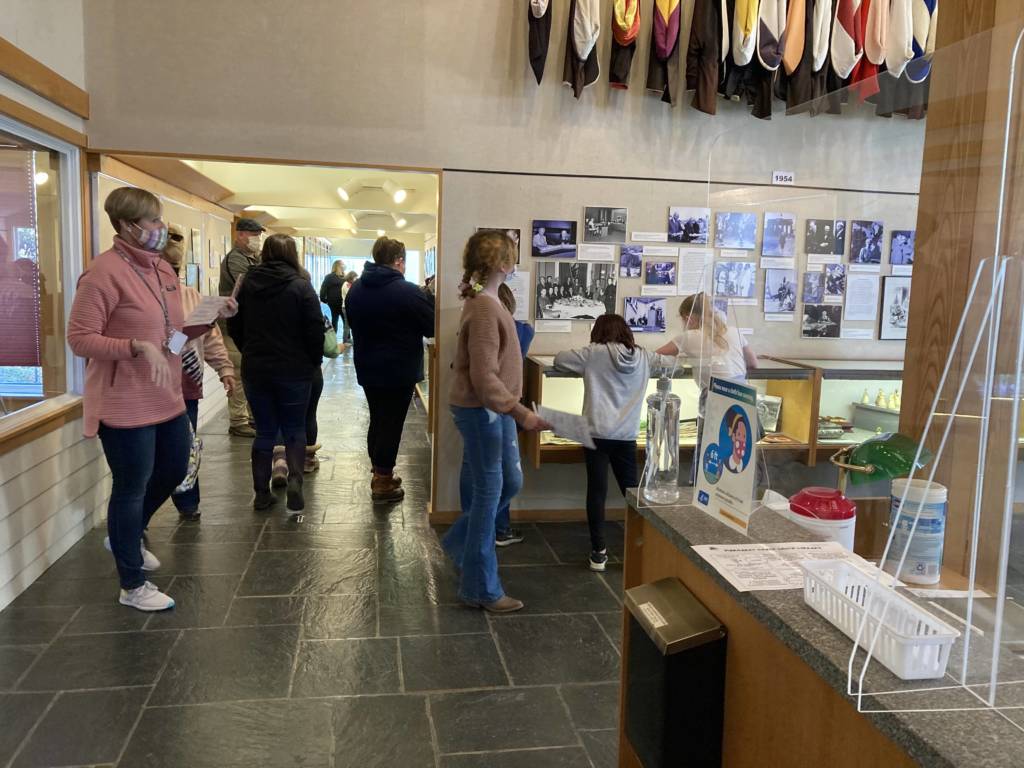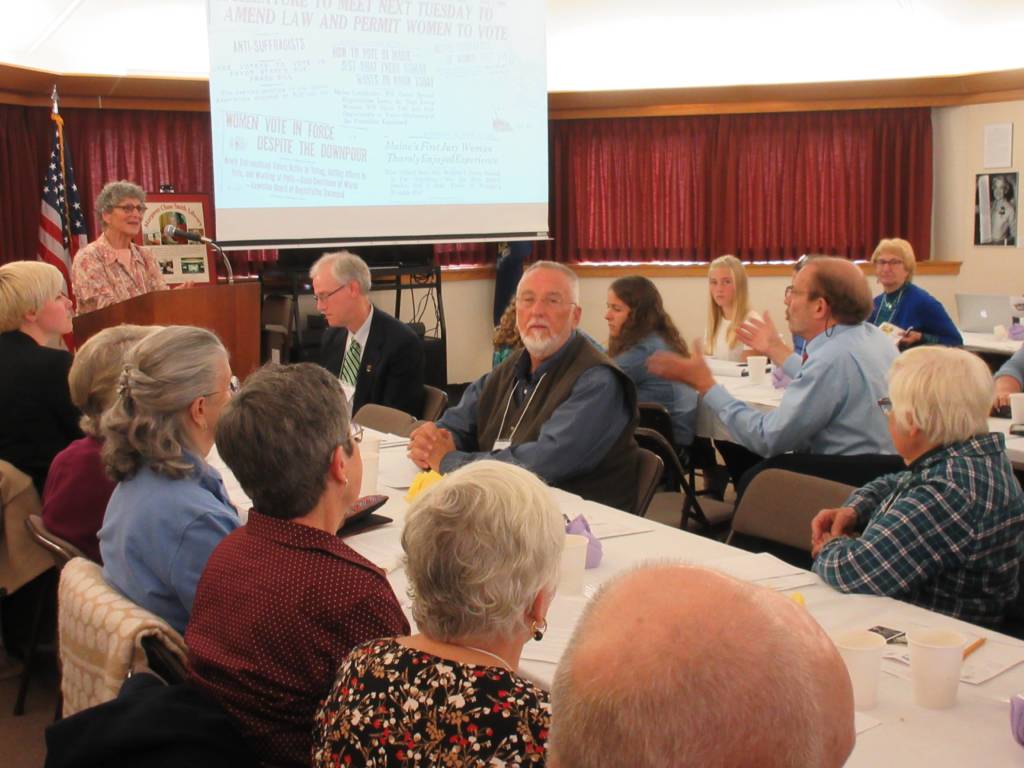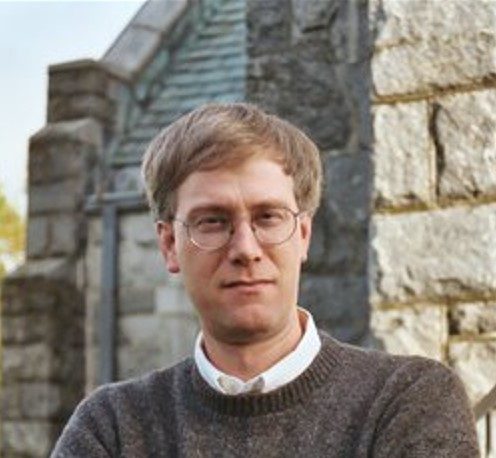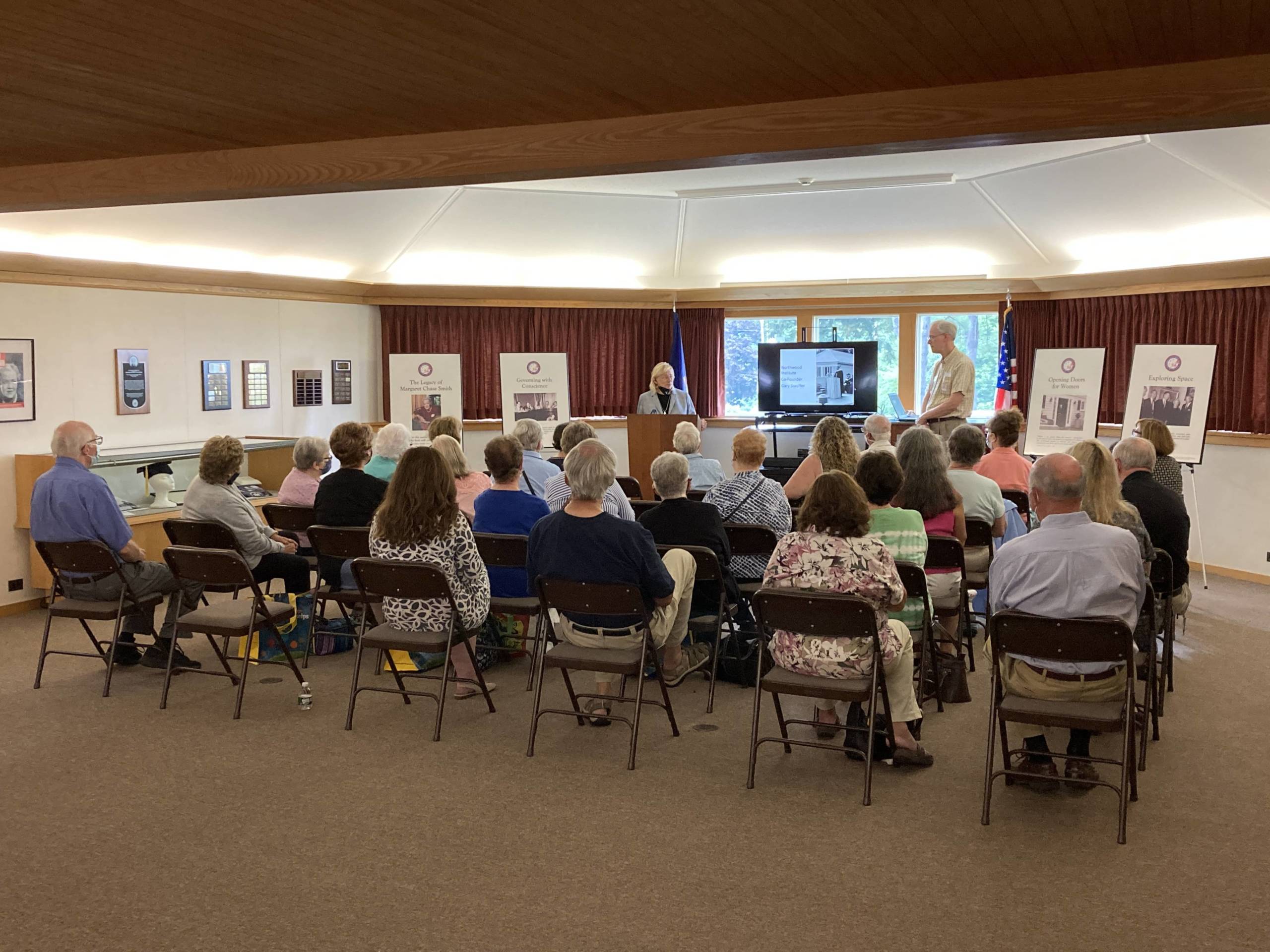The Margaret Chase Smith Library opened its doors on August 26, 1982. In the photo above, Maine Governor Janice Mills speaks during the Library’s 40th anniversary events this year. Hannaford has supported the Margaret Chase Smith Library through the Community Bag and Bloomin’ 4 Good Programs.
Tell us about the Margaret Chase Smith Library.
We’ll start with the beginning, and it goes to the end of Margaret Chase Smith’s political career. She served in Congress from 1940 to 1973, first in the House of Representatives and then the Senate. After being in Congress for over 30 years, she needed to decide what to do with her materials. Many people advised her that she should start a library, and it took some while to get that formulated. But in 1979 a foundation was created to accept her papers and her property, and then they built the library in 1982. So, we’ve been open as the facility since August 26th, 1982, which makes this year our 40th anniversary.
The mission has been to preserve the legacy of Margaret Chase Smith to promote historical research on the 20th century when she was serving in Congress, to advance the ideas of public service, which she was very committed to as a political leader, and to explore issues of civic engagement.
On a day-to-day basis, a lot of the work we do is with school groups, and the two messages we emphasize with them are aspirations for self and service to others.
On a day-to-day basis, a lot of the work we do is with school groups, and the two messages we emphasize with them are aspirations for self and service to others.
What sets your organization apart from others in your community?
The unique area that we focus on is the idea of civics. This is a country founded on the principle of “We the People,” and we like to bring issues to the fore about people getting involved in their communities, not always in a directly political way, but just the fabric of communities that makes them operate and function. So, we do a lot of programs related to civic engagement.
We have four formal functions. Of course, we have the library archival function in that we are the repository of the congressional papers of Margaret Chase Smith.
Then, we have a museum function. People can come here and learn about the history of the 20th century in America. Margaret Chase Smith was born in 1897, and she died in 1995, so that pretty much covers all of the 20th century. She was serving in Congress during World War II, the Korean War, the Vietnam War, the Women’s Rights Movement, the Civil Rights Movement and the Space Program. So, a lot of what she was dealing with in Congress are very important aspects of American history during the 20th century.
Next, as I’ve mentioned, we have an education function in addition to our work with school groups. The library is owned by a foundation in Portland, but they contract with the University of Maine to administer the library. That supplements our educational work, and we do some things directly with the University of Maine as well.
And the fourth area, and this is something that really reflects Margaret Chase Smith and what her career had been, we do specific programs related to public policy and the issues of the day.

Tell us a story that illustrates the good work you are doing.
I think after 26 years with the library, my favorite all-time story happened about five years ago.
There was a young boy who came with a school group, and we always tell the kids when they leave, “Bring your families back someday.” Well, this particular boy was so enamored of what he had seen here that he made a point of coming back with his family in the summer when school was out. And as he was getting ready to leave, he inhaled very deeply, and he said, “Smell the history.”
So, on two counts that was a very heartwarming story. First of all, that it made enough of an impression upon him that he wanted to bring his family back to see what he had seen, but then to realize that it was more than just in an intellectual way that he had understood what he had seen.
It’s one thing to talk about Margaret Chase Smith, to show them pictures of Margaret Chase Smith, to show them a video about Margaret Chase Smith, but where we really see that they understand that she was a real person, not just some historical figure in a history book, is when we take them into her house. And even though she hasn’t been in the house since 1995 when she passed away, it makes her a living person when they see her house, which we’ve tried to leave just the way it was. And, so, some of the kids can still smell the history.
What is your greatest achievement or contribution to the community?
I’d say it’s trying to be a good member of the community. A lot of the programs we do are in conjunction with other organizations, such as the public library and the afterschool program in the local school district. Being a good neighbor is one of the things that we hope we contribute to the community, and one of the ways that was reinforced for us is that we just celebrated our 40th anniversary.
The town established a Margaret Chase Smith Day on August 26th, and we had a community event. And even though we’re still trying to come out of the effects of Covid and people still have some inhibitions of coming together in a group, we were able to have a nice turnout. We still had the guest book from August 26th, 1982, and we made a point of reaching out to people that we knew were still in the community to have them come back.
And in some cases, it had been families who had come with children in 1982. And now those children were coming back. To realize that we’ve now been in the community long enough that we have this generational aspect to what we do is inspiring. Having been here 26 years, I’m now in the position where I see people who came here as students, now coming back as teachers and bringing their students.

What do you want people to know about the Margaret Chase Smith Library?
Many people in this area and throughout the state of Maine already know who Margaret Chase Smith is but some people think that we’re a private organization and that they’re not welcome. We want people to know that we are a public institution, and the public is welcome here. That is the most important thing. We’re not the public library but we are a public institution.
We want people to know that we are a public institution, and the public is welcome here.
How will you use the funds raised from the Hannaford Helps Community Bag and Bloomin’ 4 Good Programs?
As I mentioned earlier, the library is owned by a foundation, so the funds will go to the foundation, and one of the things they very specifically do is carve out some money for school field trips. About 15 to 20 years ago, we realized that the reason the schools had stopped coming was they didn’t have the money to afford the buses to transport them here for visits. So, we tried to take that off the table and we will underwrite the cost of their transportation.
For example, every fall prior to the pandemic, the Fairmount School in Bangor would bring all their fourth graders. They’ve just booked in for October 2022, and they’re coming on four different days. We will cover the cost of the buses for those four days.
Is there anything you would like to add?
We have a lot of other very specific programs. We have an essay contest that we do for high school students. We have events including what we call the Maine Town Meeting every springtime where we again try to address some current issue. In the fall, we have an international relations lecture, so we’ll have that coming up in December.
We’re very grateful for how supportive Hannaford is in the community. We were very fortunate to be selected for the month of August. August is the best month because that’s the month that the Skowhegan State Fair is going on, and the fair is right across the parking lot from the Hannaford. We were amazed when we saw the final tally; it far exceeded any of the other months when we’ve been selected. We promoted it at least once a week on our Facebook page, and we even were able to do a tie in with our Margaret Chase Smith Day on August 26th. We told people if they brought a bag, we’d give them a gift.

